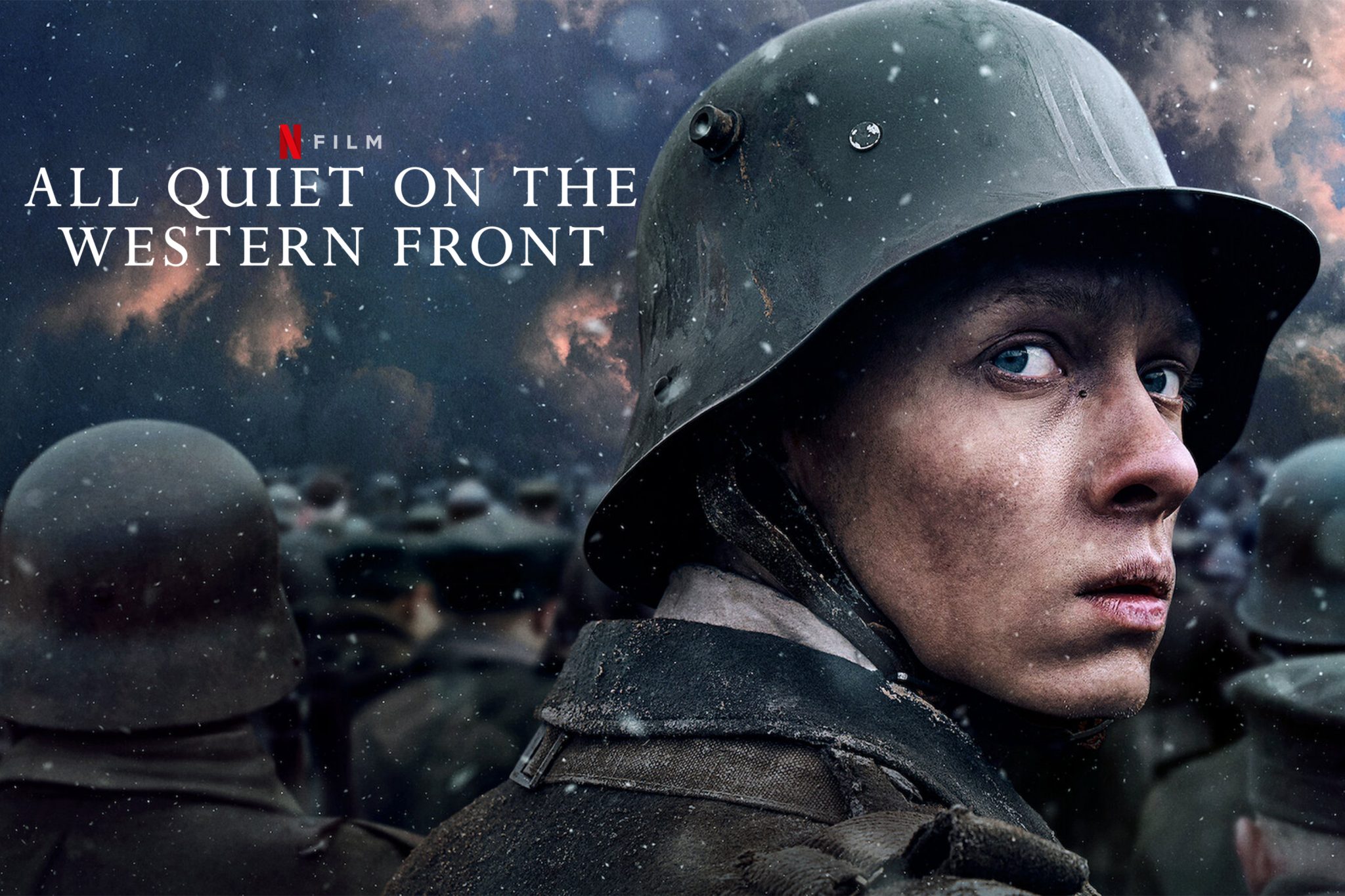All Quiet on the Western Front, a film that was just recently added to Netflix following a run in a few theatres and which is based on Erich Maria Remarque’s 1929 book about World War I, tells the tale of Paul Bäumer (Felix Kammerer), a German army recruit who joins after being encouraged to fight by a nationalistic professor. But they soon learn that in the face of war’s horrors, this flimsy sheen of patriotism quickly fades away.
That war is not joyous, or something to be applauded is the main message of Remarque’s book, as captured by director Edward Berger. The movie shows those awful waiting times when soldiers question why they are fighting and if they will ever return home. Paul’s character develops throughout the movie, becoming more dejected as the violence grows.
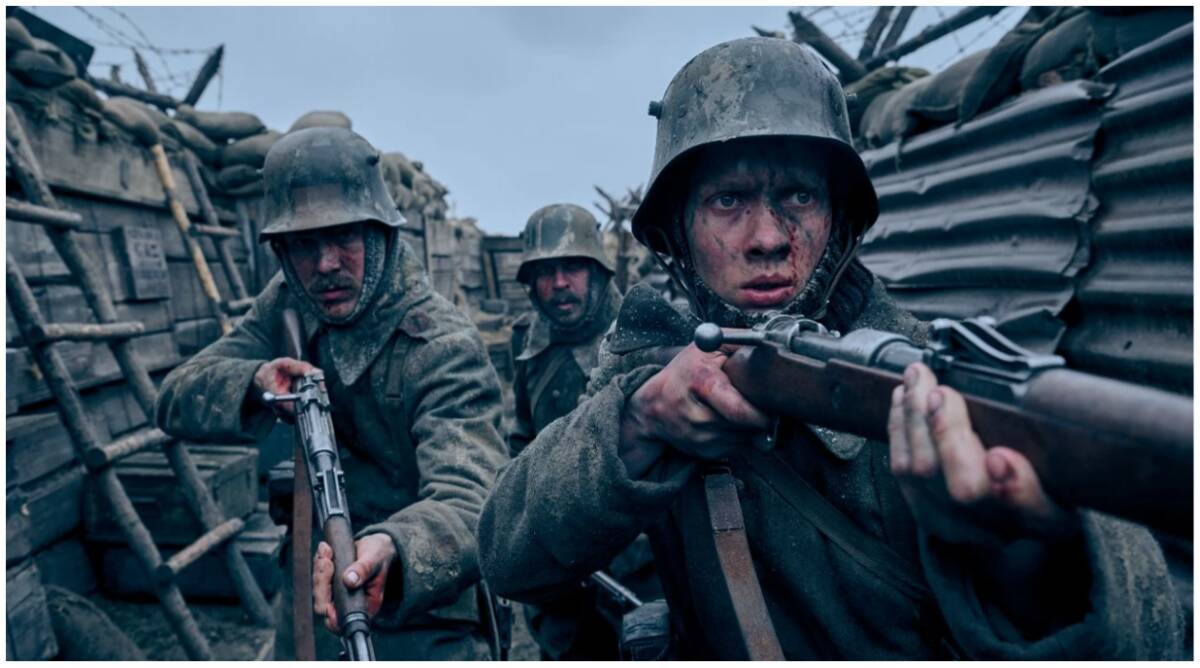
A Still From The Movie, All Quiet On The Western Front
A few brief fights interrupt the waiting. Perhaps the most moving sequence in the movie is when Paul defeats a French soldier through hand-to-hand fighting and instantly breaks down. Volker Bertelmann’s menacing soundtrack, which has a recurring three-note droning riff, provides the ideal setting for these horrifying situations throughout.
Paul survived the battle, or did he not? Why not find out? There are so many unanswered questions. Here is the All Quiet on the Western Front ending explained in detail, so let’s look at it now!
What Is The Story Of All Quiet On The Western Front?
The First World War’s third year, 1917, saw the beginning of All Quiet on the Western Front. Paul Bäumer, a young German guy, enters the army after lying on his application about his age and getting false signatures. As a member of the 78th Reserve Infantry Regiment, Paul travels to the Western Front alongside his three buddies, Albert Kropp, Franz Muller, and Ludwig Behm.
On the front lines, he makes friends with Tjaden Stackfleet and Stanislaus “Kat” Katczinsky as well. These young lads have their first taste of combat when heavy artillery fire pours down on their trenches while the onslaught against the French is at its height. Sadly, Ludwig loses his life in this situation. Paul, who is in charge of retrieving dog tags from the bodies of his fallen teammates, sobs excessively at seeing his friend who has passed away.
In spite of the continuous atrocities of the war, Paul’s unit relocates to Champagne, France, 18 months later. The young soldier assists Kat in robbing a goose from a French farmer’s house as the two head back to their post and savor a lovely lunch.
With brand-new linens, regular contacts with women, and the absence of gunfire, the troops feel uncomfortably secure here. But passing away is always a possibility. The 60 missing recruits are discovered dead inside an abandoned factory by Paul, Kat, Kropps, and Tjaden, who are looking for them.
Realizing that poisonous gas had been used to assault the area and that the inexperienced workers had removed their masks too quickly. As the fighting continued, the German government decided to end the conflict after observing the growing death toll.
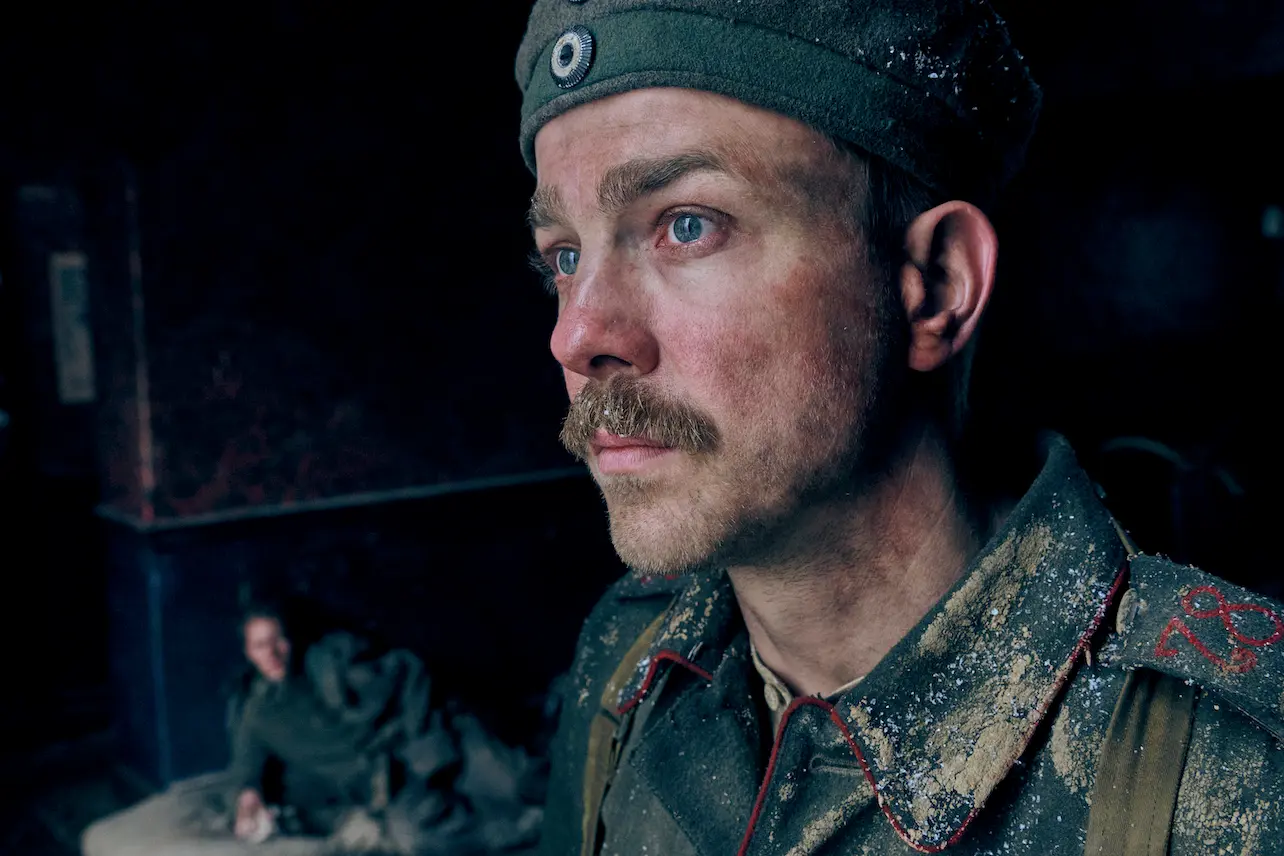
What Is the Title Of The Film Trying To Say?
The movie’s title serves as a reminder of the falsehoods and deception that were previously used by the government and its leaders to incite their countries to fight in what was undoubtedly the worst war in history.
According to the statistics, neither team suffered a substantial defeat. Everything was in order, according to people in positions of authority. On the western front lines, however, their silence resulted in millions of men being cruelly slaughtered and maimed. Millions of soldiers perished while trying to appease the egos of the commanders, who were just too self-absorbed to look beyond their own wants.
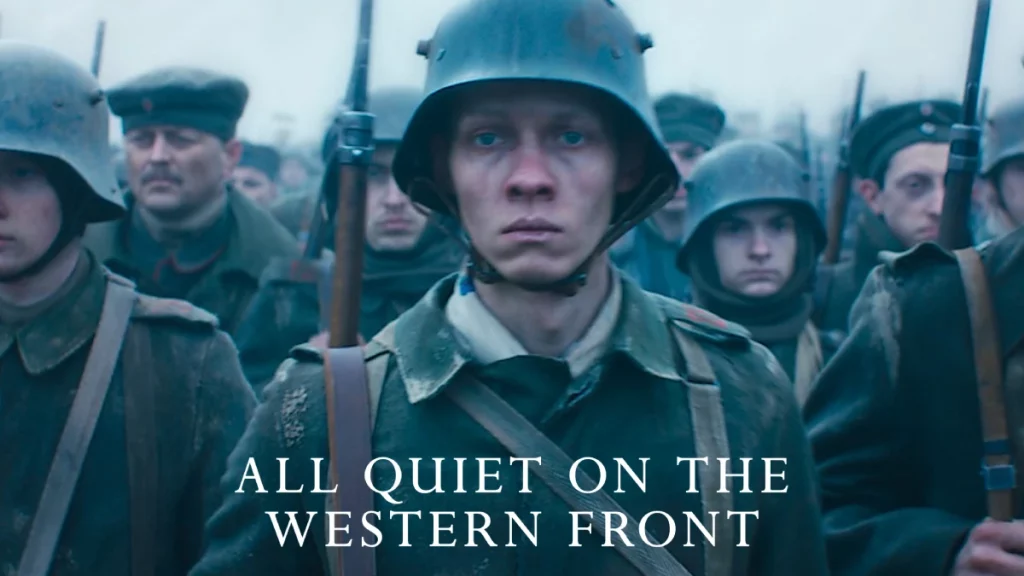
All Quiet On The Western Front Ending Explained
The search for 60 youthful enlisted people who had been absent since the previous day was entrusted to Paul, Katczinsky, Kropps, Tjaden, and others. The German government respected each and every man and soldier, not because they cherished their lives but rather because they were already low on resources and personnel.
Major Von Brixdorf, one of the General’s most trusted soldiers, presented the daily report to him. The general believed that social democrats would bring humanity’s demise. He had directed Matthias Erzberger to lead the German delegation as they traveled to Compiegne to sign an armistice with the French, although he had no intention of signing a peace agreement. His false pride made him unwilling to let up. Therefore he wished to continue the struggle.
To protect his personal interests, he was willing to offer the life of every single soldier. According to the General, without battle, a soldier’s life is nothing. He wasn’t a real soldier, though, and he wasn’t taking part in the conflict personally. But Matthias Erzberger was not at all like that. He had lost a son and was aware of how ludicrous the Germans’ orders to their troops were. He was attempting to persuade both the French and the Germans to agree. He was prepared to terminate all hostilities while knowing that the French’s suggested terms and circumstances were impractical. He didn’t want any more men to die in battle.
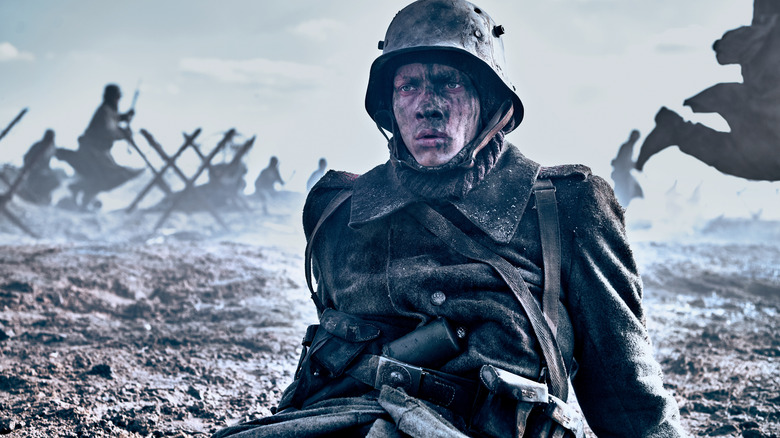
German soldiers who were famished managed to push through. They didn’t have many options. The rules were straightforward: kill or be killed. Paul and another French soldier became trapped in one of the holes. He ruthlessly stabbed the French soldier, acting as if he were possessed and unable to comprehend what he was doing. But after a moment of reflection, he saw that he had almost murdered a guy.
When he began to treat his wounds, it was already too late. Paul understood it wasn’t his war. He was meeting this man for the first time in his life, and he had no cause to murder him. He understood that all he was was a glorified mercenary with a fake sense of purpose. On November 11, 1918, the Armistice of Compiegne was signed, and it was determined that the cease-fire would begin at precisely 11 a.m.
Tjaden killed himself because he didn’t want to live with a disability, and Kropp died in the war. Katczinsky and Paul were still there. The fortunate ones, as Katczinsky informed Paul, were them. The battle they had fought had no significance for them. They lamented the loss of individuals who they had once joked and broken bread with. However, it seemed as though the nightmares were about to end soon.
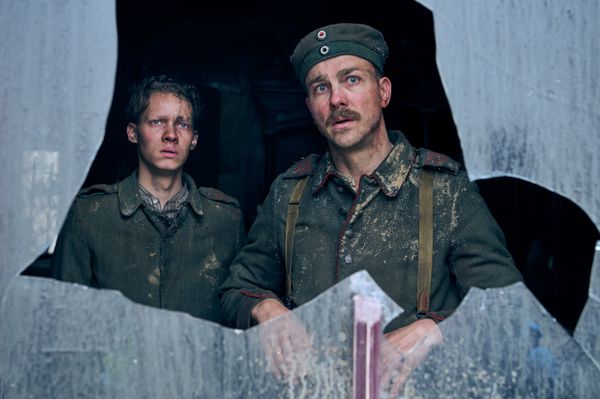
They made the decision to take a goose from the same French farmer once more. Paul entered the barn, but the farmer’s little son closed the door. Katczinsky was instructed to flee for his life by Paul when he was able to escape. The farmer’s son pursued Katczinsky and then shot him. It appeared ludicrous. A man who had survived the bloodiest war of all time was powerless against the hatred that a young kid was harboring.
The leaders were successful in sowing the seeds of retaliation. However, the General wasn’t finished yet. Since there was still some time before the peace treaty went into effect, he gave orders to the soldiers to violate the armistice and attack Latierre. Paul’s luck was less favorable this time. The rigors of war were too much for him to bear. Similar to him, another young recruit gathered every badge.
In the hopes that one day the little kid would see that fighting is pointless, Paul had sacrificed his life to save his. Paul held to reality. He never imagined that by giving his life for his country, he would one day be honored. All he wanted was a better world. But tragically, “a just world” was only going to exist in people’s imaginations as long as males with inflated egos and self-esteem controlled the reins.
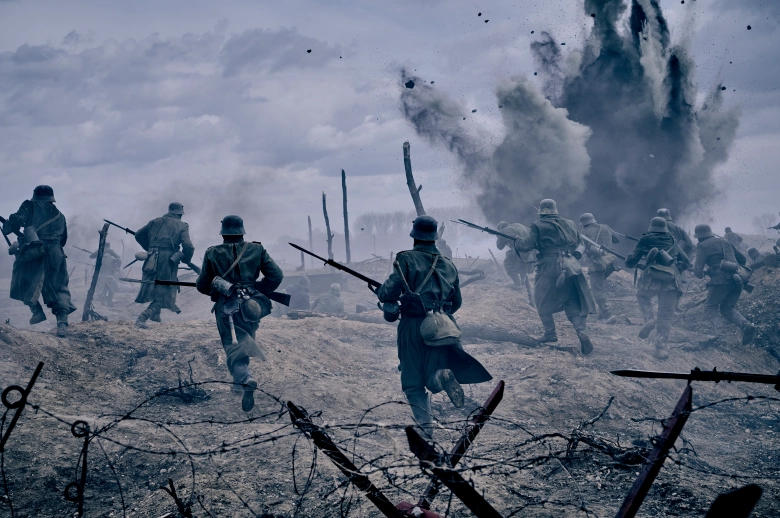
As the All Quiet on the Western Front ending explained above, we can say that the film uses the various encounters of time, the likenesses and passings of the fighters on the ground of WWI, and the battles to discover a sense of reconciliation away from the combat zone all underline the scorching enemy of war subjects tracked down in a few military motion pictures like Outside the Wire.
The conclusion of All Quiet on the Western Front demonstrates that no matter how those in authority might endeavor to spruce up battle with promulgation and nationalism, the outcome is always the same for those who must fight, no matter which side they are on. It contrasts the experiences of officers and politicians with the suffering of the common soldier. In the end, the most that a conflict’s participants can hope for is to shield the coming generation from its effects while understanding that war will always cost more than it is worth.
All Quiet On The Western Front Review
The conflict is being ended, honestly. The role of Matthias Erzberger is played by Hollywood actor Daniel Bruhl. Erzberger is a German diplomat who is trying to negotiate peace with the French after losing his son in the war. He is conscious of the fact that more lads die every minute they prolong the armistice. But politics is a bloody game, and those like General Friedrichs don’t care about the lives lost in the name-branding process.
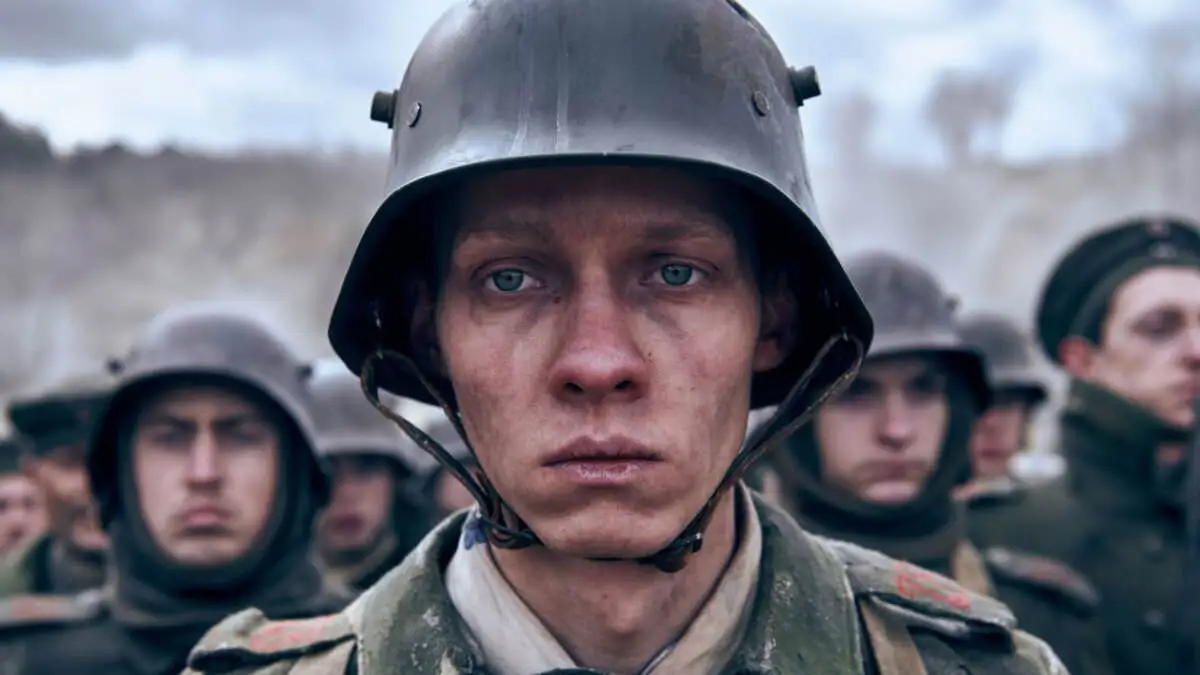
With little hope for the future, the warriors accept each day as it comes. They daydream of life after the war as they forage for food and watch French women go by. The following time, he is ready to fight and asks, “How long until we go again,” as Kat is talking about having more kids. Again, the dualism. They are continuously overpowered by tanks, flamethrowers, fatigue, and despair. Due to their excellent writing and heartfelt performances, the fully developed characters stand out.
The movie has some horrific and spooky scenes that will make you want to turn away. Additionally, there are times when diplomatic ignorance will make you furious. All of them are equally horrific, yet they just scratch the surface of how inhumane the atrocities that took place during the Great War were. Additionally, given all that is occurring in Europe, the movie couldn’t have come out at a better moment, as Edward Berger stated in an interview.
In addition to portraying the horrors of war, All Quiet on the Western Front also conveys the idea that young men who are forced to battle are only tools in the hands of ruthless generals, like lambs to the slaughter. The depravity of men during the war is shown in other works of art, and it won’t be the last, either.

















